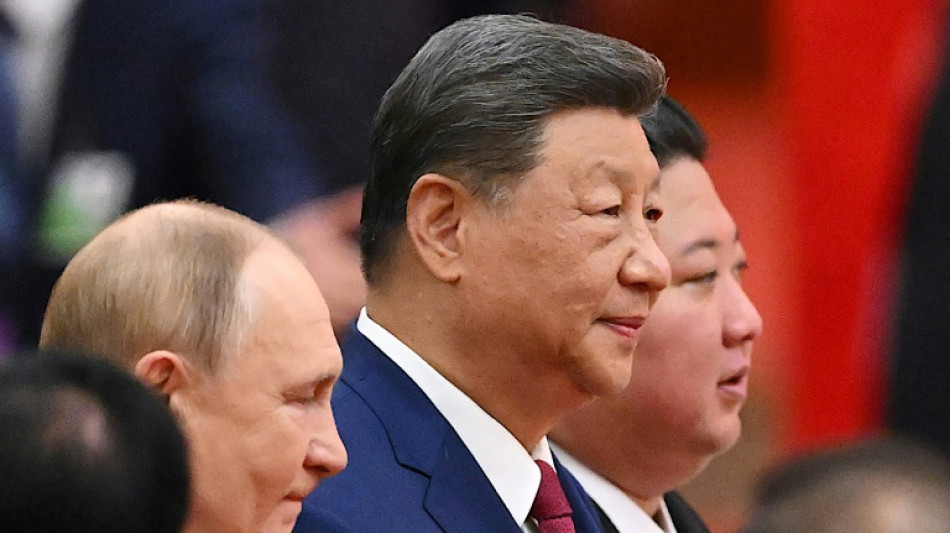
-
 Late Guirassy winner for Dortmund trims Bayern's lead atop Bundesliga
Late Guirassy winner for Dortmund trims Bayern's lead atop Bundesliga
-
'Free the mountains!": protest in Milan over Winter Olympics

-
 Gyokeres double helps Arsenal stretch Premier League lead
Gyokeres double helps Arsenal stretch Premier League lead
-
Six Nations misery for Townsend as Italy beat sorry Scotland

-
 Spain, Portugal face fresh storms, torrential rain
Spain, Portugal face fresh storms, torrential rain
-
Opinions of Zuckerberg hang over social media addiction trial jury selection

-
 Over 2,200 IS detainees transferred to Iraq from Syria: Iraqi official
Over 2,200 IS detainees transferred to Iraq from Syria: Iraqi official
-
Norway's Ruud tops Olympic men's freeski slopestyle qualifying

-
 Czech qualifier Bejlek claims first title in Abu Dhabi
Czech qualifier Bejlek claims first title in Abu Dhabi
-
French duo reach Shanghai, completing year-and-a-half walk

-
 Australian snowboarder James eyes elusive Olympic gold
Australian snowboarder James eyes elusive Olympic gold
-
Sequins and snow: Eva Adamczykova makes Olympic return

-
 Vonn set for Olympic medal bid after successful downhill training
Vonn set for Olympic medal bid after successful downhill training
-
Shepherd takes hat-trick as West Indies beat Scotland in T20 World Cup

-
 Sausages will sell after thrill-seeker Von Allmen wins Olympic downhill
Sausages will sell after thrill-seeker Von Allmen wins Olympic downhill
-
Swiss racer Von Allmen wins first gold of Winter Olympics

-
 'Wake up': Mum sparks comeback after scare for freeski star Gu
'Wake up': Mum sparks comeback after scare for freeski star Gu
-
Von Allmen wins men's Olympic downhill gold, first of Games

-
 First medals up for grabs at Winter Olympics
First medals up for grabs at Winter Olympics
-
Afghanistan captain Khan harbours dream of playing in Kabul

-
 Lindsey Vonn completes second Winter Olympics downhill training run
Lindsey Vonn completes second Winter Olympics downhill training run
-
Freeski star Gu survives major scare in Olympic slopestyle

-
 Iran FM looks to more nuclear talks, but warns US
Iran FM looks to more nuclear talks, but warns US
-
Hetmyer's six-hitting steers West Indies to 182-5 against Scotland

-
 After boos for Vance, IOC says it hopes for 'fair play'
After boos for Vance, IOC says it hopes for 'fair play'
-
Thousands gather as Pakistan buries victims of mosque suicide attack

-
 Lindsey Vonn completes second downhill training session
Lindsey Vonn completes second downhill training session
-
US pressing Ukraine and Russia to end war by June, Zelensky says

-
 Faheem blitz sees Pakistan avoid Netherlands shock at T20 World Cup
Faheem blitz sees Pakistan avoid Netherlands shock at T20 World Cup
-
Takaichi talks tough on immigration on eve of vote

-
 England's Salt passed fit for T20 World Cup opener
England's Salt passed fit for T20 World Cup opener
-
Spain, Portugal brace for fresh storm after flood deaths

-
 Pakistan bowl out Netherlands for 147 in T20 World Cup opener
Pakistan bowl out Netherlands for 147 in T20 World Cup opener
-
Pushed to margins, women vanish from Bangladesh's political arena

-
 Crypto firm accidentally sends $40 bn in bitcoin to users
Crypto firm accidentally sends $40 bn in bitcoin to users
-
Pistons end Knicks' NBA winning streak, Celtics edge Heat

-
 Funerals for victims of suicide blast at Islamabad mosque that killed at least 31
Funerals for victims of suicide blast at Islamabad mosque that killed at least 31
-
A tale of two villages: Cambodians lament Thailand's border gains

-
 Police identify suspect in disappearance of Australian boy
Police identify suspect in disappearance of Australian boy
-
Cuba adopts urgent measures to address energy crisis: minister

-
 Not-so-American football: the Super Bowl's overseas stars
Not-so-American football: the Super Bowl's overseas stars
-
Trump says US talks with Iran 'very good,' more negotiations expected

-
 Trump administration re-approves twice-banned pesticide
Trump administration re-approves twice-banned pesticide
-
Hisatsune leads Matsuyama at Phoenix Open as Scheffler makes cut

-
 Beyond the QBs: 5 Super Bowl players to watch
Beyond the QBs: 5 Super Bowl players to watch
-
Grass v artificial turf: Super Bowl players speak out

-
 Police warn Sydney protesters ahead of Israeli president's visit
Police warn Sydney protesters ahead of Israeli president's visit
-
Simi Khanna Launches Simi Beauty SK: A Natural Skincare Line Blending Luxury, Wellness, and Purpose

-
 Best Gold IRA Companies February 2026 Announced (Top Gold-backed IRA Companies Revealed)
Best Gold IRA Companies February 2026 Announced (Top Gold-backed IRA Companies Revealed)
-
Bolivia wants closer US ties, without alienating China: minister


Could humans become immortal, as Putin was heard telling Xi?
Vladimir Putin and Xi Jinping have been recorded on a hot mic discussing how organ transplants and other medical advances could let humans live past 150 years -- or even become immortal.
But are these comments by the Russian and Chinese leaders, which were picked up during a Beijing summit on Wednesday, backed by scientific evidence?
Experts in human ageing told AFP that some of these ideas remain far-fetched, but serious research is also increasingly revealing more about why we age -- and how we could try to stop it.
- Is there a human lifespan limit? -
The conversation suggested that fending off the ravages of age was on the minds of Putin and Xi, who are both 72 and have not expressed any desire to step down.
Thanks to the "development of biotechnology, human organs can be continuously transplanted, people could get younger as they grow older, and may even become immortal", Putin told Xi.
The Chinese leader responded by saying there were predictions humans could "live to 150 years old" within this century.
There is no scientific evidence to support the idea that a human could live forever.
Scientists have not even reached a consensus on whether there is a biological limit on human lifespan.
"The debate is not settled," Ilaria Bellantuono, a researcher on the biology of ageing at the University of Sheffield, told AFP.
Indeed, despite massive progress in most areas of health in the last few decades, human longevity records have stopped being broken.
France's Jeanne Calment, who died at the age of 122 in 1997, still holds the record for oldest confirmed age.
This does not necessarily mean we have reached the limits of longevity.
According to 2018 research in the journal Science, mortality rates eventually level off, meaning a 115-year-old is no more at risk of dying than someone aged 105.
Other researchers have warned that data about extreme longevity could be misleading, citing numerous cases of people forging birth certificates to commit pension fraud.
- What about replacing organs? -
Putin's comments went beyond simply fending off death, suggesting that by regularly replacing misfiring organs people could actually become younger.
"It's pure madness," said Eric Boulanger, a professor of biology and ageing at France's Lille University.
Boulanger listed a broad range of medical barriers and ethical concerns, including the constant need for fresh organs and the traumatic effect that repeated transplant surgeries would have on the body.
And our bodies are made up of more than just organs, he emphasised.
They also have fatty tissue, bones and more, all impacted by ageing in a complex and interconnected way that makes the concept of changing out organs like car parts unrealistic.
- Money in long life? -
Huge amounts of money have recently been invested in longevity efforts, which have also been the subject of a booming lifestyle and wellness industry.
Putin himself has shown interest, with Russia launching a 38-billion-ruble ($460-million) project last year focused on regenerative medicine and longevity.
The subject is also a preoccupation of the Silicon Valley-led transhumanist movement, including billionaire Peter Thiel, a supporter of US President Donald Trump who has invested millions in longevity projects.
Fellow tech figure Bryan Johnson has become somewhat emblematic of the issue by setting himself the goal of eternal life -- and testing many of the latest anti-ageing theories, techniques and trends on himself.
However, mainstream scientists have been critical of such efforts, warning they lack scientific rigour and could even be dangerous.
- Realistic research? -
Some recent scientific advances have raised hopes we could one day fight back against ageing.
The researchers interviewed by AFP in particular highlighted a field called epigenetics.
Changes to DNA have long been thought to be an important factor in why humans age.
However, epigenetics -- which studies how genes can toggle on or off without altering DNA -- has recently gained attention.
Over time, this toggling seems to wear down in a process thought to be central to ageing.
Research published in the journal Aging Cell in June found that the drug rapamycin -- which appears to affect epigenetic ageing -- has helped extend the lifespan of several animals, including mice.
But there is no guarantee the drug will work in humans.
For now, the researchers suggested people worry less about hypothetical ways to increase how long they are alive and instead make sure the time they have left is lived well.
"The focus should be on extending the number of years in good health," Bellantuono said.
D.Sawyer--AMWN


